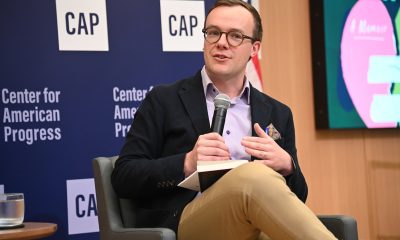National
Celebrating, honoring and remembering America’s LGBTQ veterans
Nov. 11 is Veterans Day
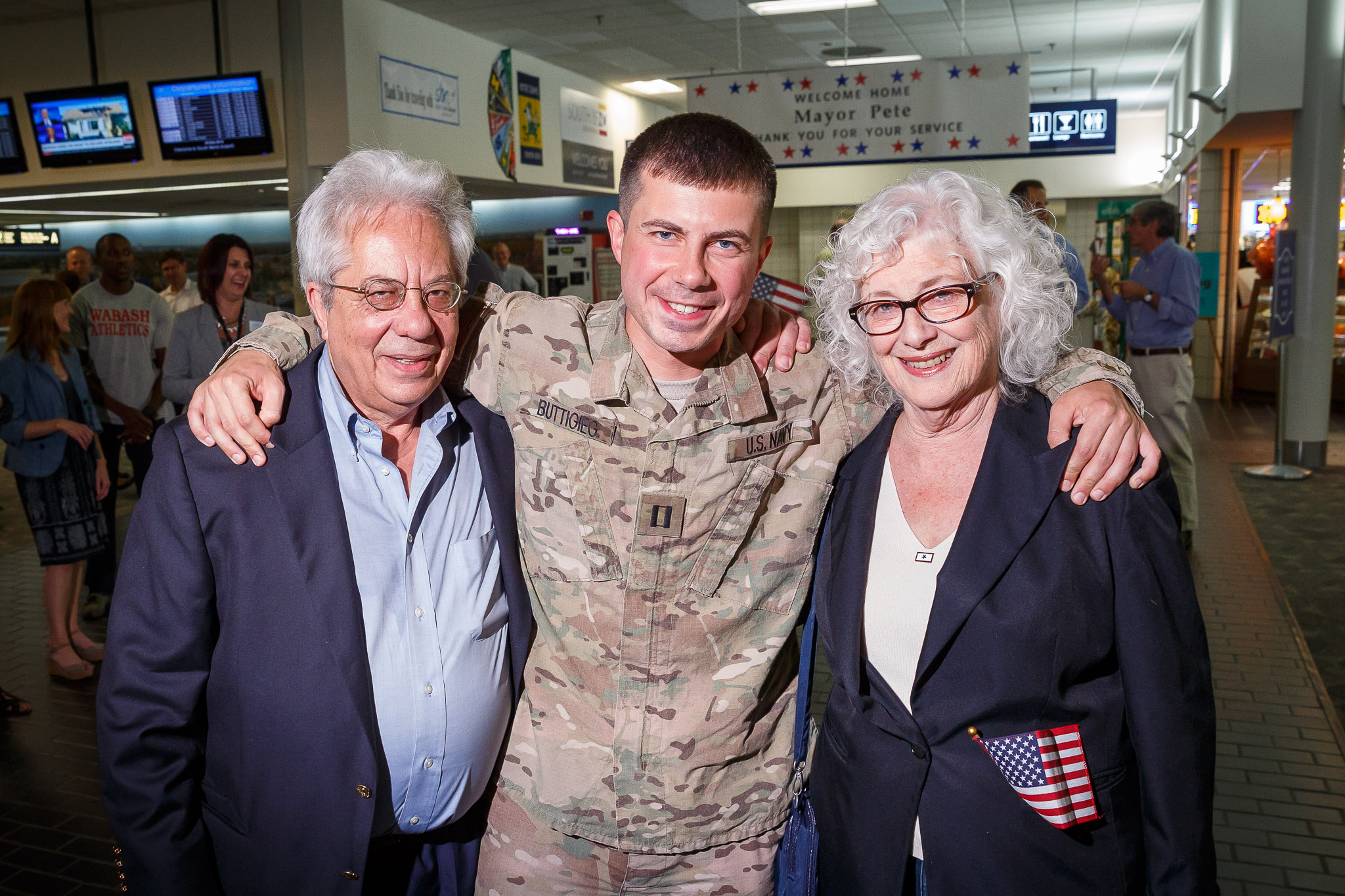
Nov. 11 is Veteran’s Day in the U.S. For much of the rest of the world and especially in Europe, it is Armistice Day, the day that marks the end of World War I, which was also referred to as ‘the Great War.’ On the 11th hour of the 11th day of the 11th month in 1918 when the armistice was signed, over 20 million people had lost their lives.
“On the 11th hour, of the 11th day, of the 11th month, we will remember them,” General of the Armies of the United States John Joseph ‘Black Jack,’ Pershing. (Sept. 13, 1860 – July 15, 1948)
There are an estimated 1 million currently living lesbian, gay, bisexual, transgender and queer veterans in the United States. They have served in the U.S. Army, Air Force, Navy, Marines, Coast Guard and now the U.S. Space Force.
They served their country in conflicts spanning from World War II up through “Operation Enduring Freedom” as well as in peacetime. But for many who served until the end of “Don’t Ask Don’t Tell” on Sept. 20, 2011, and later President Joe Biden’s order ending the ban on transgender service in 2021, they served in silence risking discharge and societal ostracization if their sexual orientation or gender identity was revealed.
Formerly San Francisco-based LGBTQ activist Michael Bedwell tells the story of Sarah Davis, who served during World War II in the U.S. Navy as a member of the WAVES (Women Accepted for Volunteer Emergency Service.) Davis, whose nickname was “Sammi,” was from a small town in Iowa in the heartland of America.
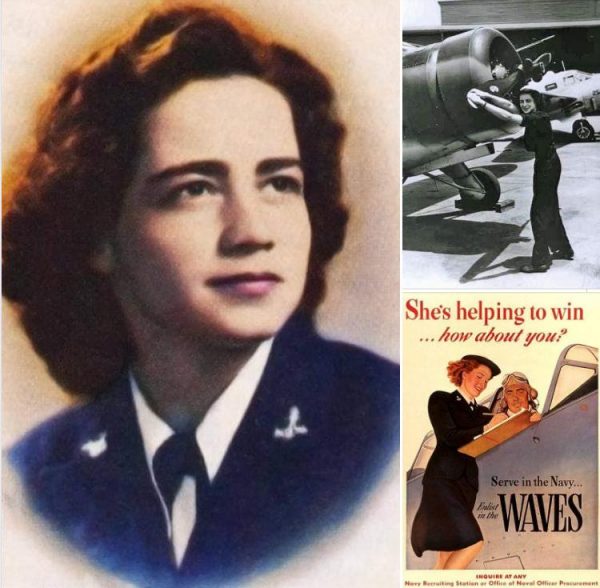
Davis later she said that she joined in 1943 for “the adventure, the excitement. I was going to save the world for democracy. I liked the military life. I liked the discipline. I liked the order. I liked the marching, and the tunes.” Though WAVES could not serve aboard combat ships or aircraft, they supported them; Davis was an Aviation Machinist Mate First Class at the Naval Air Station in Vero Beach, Fla., and wrote news stories for the Naval Flight Exhibition Team in Jacksonville, Fla.
Before volunteering, she remembered she hadn’t heard “anything about being queer. Didn’t even know that word existed when I went into the Navy. We used to go to the bars open to lesbians, and hug and kiss and so on, but we had to keep things under control. And we definitely couldn’t acknowledge commanding officers who might be lesbian, because you could get into big trouble. You had to form relationships very discreetly and privately.”
After the war, she was interrogated during a witch hunt, a part of the about-face the military did after mostly “looking the other way” during the war once they no longer needed so many troops, and began lecturing new women recruits about the horrors of aggressive lesbians. Davis survived by breaking up with her lover, and denying she knew other gay women, and was ultimately given an honorable discharge. But she told documentary filmmaker Arthur Dong that, “[I]t made me very, very guarded for years and years. It took away what power that I thought I had. It broke my spirit, really, a lot. And that’s been hard to recover, very hard.”
It took many years, but one of the ways she found healing, and came out publicly, was winning seven gold medals in the seniors category at 1990’s Gay Games. In the interim, she attended Stanford University and USC, and graduated in 1952 in occupational therapy and certified in physical therapy in 1956. In 1963, she received a master’s degree in photography from San Francisco State College. She also served in the Peace Corps in 1971, serving in Swaziland, worked for San Francisco’s Visiting Nurses Association, and became a deacon in San Francisco’s All Saints’ Episcopal Church. For years she lived with her dog, Rambo, in an 1896 three-story Victorian on Clayton Street in the Haight that she bought in 1960, and ran as a boardinghouse worthy of one of Armistead Maupin’s “Tales of the City” characters.
A 2008 New York Times article about it being remodeled by its new owners upon the move by Davis, then 81, to an assisted living facility noted that, “The mural of a naked goddess that once dominated the entrance parlor is gone, [and] the communal shower with its swinging saloon doors. But a few remnants survive, including a wrought-iron peace sign on the back porch and, in a bathroom, a stained-glass portrait of St. Peter that had been salvaged in the 1960s from a demolished church. Tenants and guests [had] painted walls and ceilings with mandalas, Rastafarian basketball players, and a tree root that morphed into a rabbit, horse and wolf.”
Upon her death the next year back in Iowa, Davis left a trust from her sale of her colorful house benefiting various groups including Marin County’s Canal Alliance that serves low-income immigrant populations with “crisis counseling, a food pantry, classes in English, computers and citizenship, and affordable legal help to keep families together.” A niece wrote: “Aunt Sarah was a positive influence in my live. She always encouraged me to reach for the stars. She lived her life to the fullest, and had many exciting experiences. She followed her mother’s example and continued fighting for women’s rights. She will be missed.”
“Gay and Lesbian soldiers faced extraordinary discrimination during World War II. Most found new communities of people and thrived despite the oppression. Discover the film Coming Out Under Fire that shares their story.” ~ the National World War II Museum, New Orleans.
One of the most significant figures in the American LGBTQ rights movement was himself also a veteran. Franklin Edward Kameny had been drafted and served in the Army during World War II and later upon discharge he matriculated first at Queens College, City University of New York then attending graduate school at Harvard University earned a doctorate in astronomy.
While working as astronomer in the Army Map Service in D.C., Kameny was outed and fired from his position in 1957 leading to his 54 years long career as a LGBTQ activist and spokesperson for equality, which only ended when Kameny died on National Coming Out Day on Oct.11, 2011.
Kameny had a lengthy list of accomplishments during his career as an activist including his being a co-founder of the D.C., Mattachine Society, and along side the Mattachine membership launched some of the earliest public protests by gays and lesbians with a picket line at the White House on April 17, 1965.
He also worked to remove the classification of homosexuality as a mental disorder from the American Psychiatric Association’s Diagnostic and Statistical Manual of Mental Disorders.
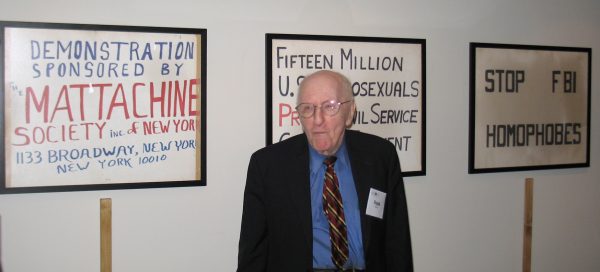
(Photo by DC Virago)
In the early 1970’s Kamney became friends and worked with an Air Force Vietnam veteran who soon became the public face of gays in the military.
“When I was in the military they gave me a medal for killing two men and a discharge for loving one.” ~ from the headstone on the grave of Technical Sergeant (TSgt) Leonard Matlovich, U.S. Air Force
U.S. Air Force Technical Sergeant (TSgt) Leonard Matlovich, U.S. Air Force had served three tours of duty, earning the Bronze Star for bravery, the Purple Heart and an Air Force commendation during his time in Vietnam.
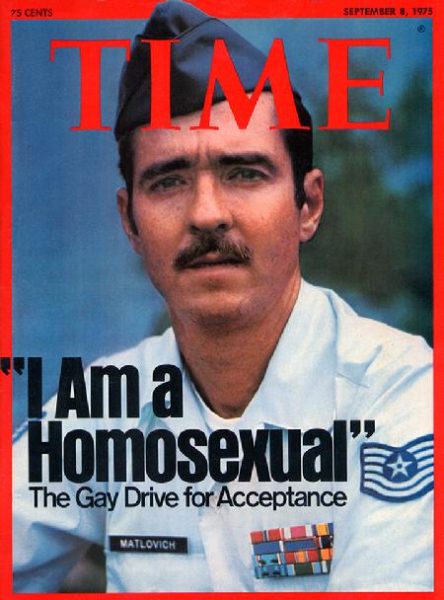
In March 1975 Matlovich became the first uniformed member of the armed forces on active duty to challenge and fight discrimination against gays and lesbians and he became the first openly gay person to be on the cover of “Time Magazine.”
Although he was ultimately discharged in 1980 a federal judge ordered the Air Force to reinstate him with back pay. The Air Force negotiated a settlement with Matlovich and the federal court’s ruling was vacated when he agreed to drop the case in exchange for a tax-free payment of $160,000.
Matlovich, like Frank Kamney became active in gay rights and AIDS organizations.
In 1986, he was diagnosed with AIDS and when he succumbed to the disease and died in West Hollywood, Calif., in June 1988, his body was returned to D.C. and buried at the Congressional Cemetery in Southeast Washington with full military honors.
The stories of LGBTQ veterans span beyond activism. In August 2021 during the fall of Kabul, Afghanistan, a trans government contractor for the State Department and former U.S. Air Force Sgt. Josie Thomas found herself trapped along with her colleagues at the diplomatic support facility known as Camp Alvarado located on the outskirts of Afghan capital city’s airport.
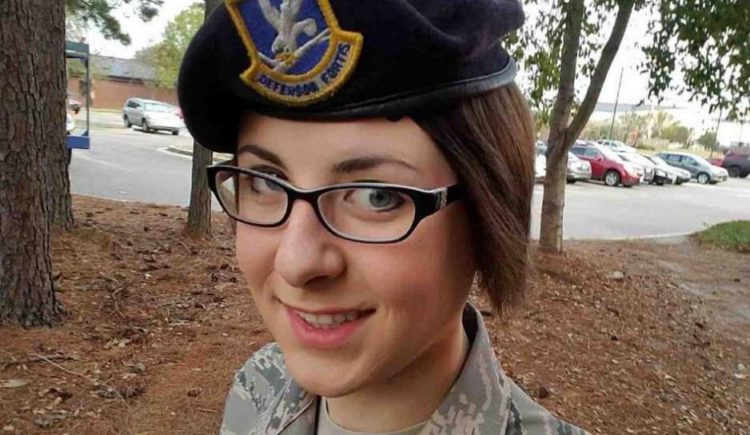
Thomas, in a series of text messages provided to the Washington Blade on background by a colleague of hers, relayed that she and others were aware of the immediate presence of the Taliban insurgents, which was communicated at the time Afghan security forces had abandoned their posts.
One of her colleagues communicating with Thomas received a text from her stating that elements of the U.S. Army’s 82nd Airborne Division had arrived at the Camp Alvarado diplomatic support facility;
“Just talked to her again for several minutes. The 82nd has taken control of her compound and there’s a clear route from there to the flight line now. That the place is looking like a refugee camp with the amount of displaced coalition personnel and there’s no aircraft coming in to evacuate people yet.”
On Aug. 17, she was evacuated and flown home.
Likely one of the most high profile contemporary LGBTQ military veterans is the current Transportation Secretary Pete Buttigieg, shown in the featured photograph with his parents. Buttigieg, a graduate of Harvard College and the University of Oxford, served in the U.S. Naval Reserve from 2009 to 2017 and left with the rank of Lieutenant (O-3.)
Buttigieg, the first openly gay man to be confirmed by the U.S. Senate to a presidential cabinet post had previously been elected and served as the 32nd mayor of his hometown of South Bend, Ind.
These are but a very select few stories of the tens of thousands of LGBTQ Americans who have proudly worn the uniform of their country.
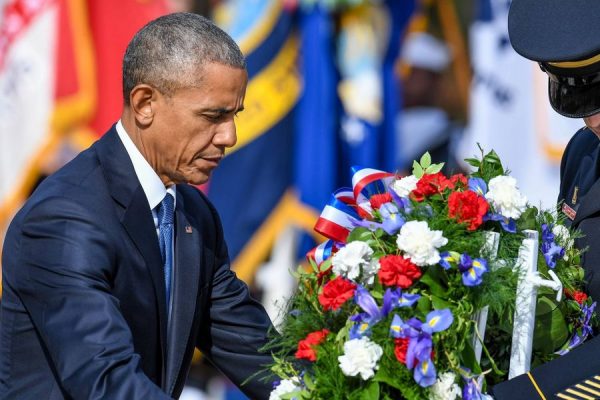
(Photo credit: U.S. Army Photography Unit, the Pentagon, Military District of Washington)
On Memorial Day 2013, this reporter, while working as the Washington Bureau Chief for another LGBTQ publication encountered the story of one of those veterans:
ARLINGTON, Va. — Every year that I have lived and worked in this city [Washington, D.C.] I have always gone to Arlington National Cemetery to observe the Memorial Day ceremonies.
Afterward, I wander through the grounds, just to watch, maybe to listen, but mostly to contemplate on the sacrifices made by those brave souls whose final resting place has become hallowed ground — a literal garden of stones.
Arlington’s rolling hills are a place of extraordinary beauty, a fitting repository for the memory of the living history of the United States. Names from the history books leap off the pages as one strolls through the grounds: “Byrd, Taft, Lincoln, Kennedy, Rickover, Marshall, Pershing,” followed by the names of the thousands of soldiers, sailors, airmen, and coast guardsman who gave their lives to secure the freedoms promised by the American Constitution.
In his remarks today, President Barack Obama reminded Americans they must honor the sacrifices of their military service members, particularly as U.S. combat roles change and the nation’s involvement in Afghanistan is winding down.
Adding that Arlington “has always been home to men and women who are willing to give their all … to preserve and protect the land that we love,” the President praised the selflessness that “beats in the hearts” of America’s military personnel.
Obama’s words stuck with me as I walked along through the ocean of gravestones, pausing occasionally to read the names, the inscriptions, and wonder what each person was like.
Scattered throughout the graves proudly marked with miniature American flags fluttering in the bright noontime sunlight, I observed families, loved ones, and friends who had come to honor their fallen.
Then I happened upon one grey haired older gentleman standing quietly in front of a headstone, obviously lost in his thoughts. As I tried to unobtrusively move around him, he look up at me and smiled.
I greeted him, and he greeted me back. He saw my press credentials hanging from my neck and asked whom I worked for.
I told him, momentarily wondering what type of reception I’d receive as, let’s face it, the LGBTQ community still has its detractors, and to my shock, he looked back at me, with tears forming in his eyes.
“You’re gay?”
“I am,” I answered.
“Lot of changes since I was a, a kid,” he trailed off. I pointed at headstone and quietly asked if the person was a friend or a family member.
“He’s my, well was my best bud, yeah, I dunno…”
The gentleman looked stricken and it was certainly not my intention to interview him, impromptu or not. But yet I sensed that something was left hanging so I took the plunge and asked him for a few details, if he didn’t mind sharing them. As it turns out, that’s exactly what he wanted… to share, to have a conversation about the person whose grave we were standing over.
The two men had grown up in eastern Ohio, in a small rural farming community. They played football, went fishing, did farm work, and discovered that after a few failed attempts at pursuing the fairer sex, their real romantic interests laid in each other.
By the time they had graduated from high school, the Vietnam conflict had escalated and, rather than wait to be drafted, they decided to join the U.S. Marines together. They went to boot camp, and not long after graduation, found themselves on troop planes headed for Vietnam.
“We were lucky,” he said, “We both got assigned to the 2nd Battalion, 26th regiment.”
But good luck turned sour as their battalion found itself in the middle of one of the nastiest battles of the 1968 Tet Offensive in the battle for Khe Sanh.
“I lost him that morning,” he told me, pointing at the inscribed date of death on the simple white marker — February 7, 1968. “He was just 19.”
The tears came freely and I waited. Then we talked some more.
He told me that after he lost his love, “I went straight and got married.” Just a fews years ago, he lost his wife to cancer.
He has grandkids that he says will never know the truth — he just can’t be open with them, but at the same time, never does a day go by that he doesn’t think about and mourn the loss of his friend, his partner — and the promise of what might have been.
“I was glad to see DADT end,” he told me. “At least some other couples won’t have to hide like we did.”
I thanked him for his service and his time talking with me and walked away reflecting on all of the unknown LGBT military folk buried around me who, like that lost soldier, suffered in silence and hid, yet still believed in a greater good of which they ultimately gave their lives for their country.
***************************************
Across Lafayette Park on Vermont Avenue, N.W., a block from the White House, stands a nondescript government office building that houses the headquarters of the Department of Veterans Affairs. On a pair of metal plaques at its entrance is inscribed the words of the 16th president of the United States, Abraham Lincoln, which define the motto of the agency: “To care for him who shall have borne the battle and for his widow, and his orphan.”
The Department of Veterans Affairs is a leading provider for healthcare for LGBTQ vets. While the VA is working to be a national leader in health care for LGBTQ veterans and wants to assure that high-quality care is provided in a sensitive, respectful environment at all VA health care sites nationwide, the fact remains that these LGBTQ veterans can face increased health risks and unique challenges in accessing quality health care.
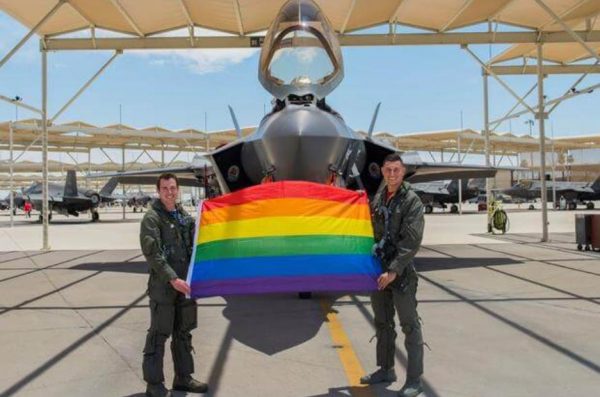
Many of LGBTQ veterans may receive care at the Department of Veterans Affairs, but others may be unaware of what services are available or have concerns about discrimination.
A question poised is simple; What is VA’s policy on LGBTQ veterans?
According to the VA, its policy is — all veterans deserve respect and dignity. VA has a nondiscrimination patient care policy that includes sexual orientation and gender identity and expression. Specifically, it is the policy of Veterans Health Administration “… that staff provide clinically appropriate, comprehensive, veteran-centered care with respect and dignity to enrolled or otherwise eligible transgender and intersex veterans, including but not limited to hormonal therapy, mental health care, preoperative evaluation and medically necessary post-operative and long-term care following gender confirming /affirming surgery. It is VHA policy that veterans must be addressed based upon their self-identified gender identity… ” (VHA Directive 1341, p. 3)
What services does VA provide for LGBTQ veterans?
Each VA facility is required to have an LGBTQ coordinator who can connect veterans with culturally competent providers, educate staff about where gaps in knowledge/training exist and to help create a more welcoming environment. (VHA Directive 1341, May 23, 2018)
The VA is authorized to provide:
- Hormone treatment
- Substance use/alcohol treatment
- Tobacco cessation treatment
- Treatment and information on prevention of sexually transmitted infections/PrEP
- Intimate partner violence reduction and treatment of after effects
- Heart health
- Appropriate cancer screening, prevention and treatment
What can LGBTQ veterans expect when accessing their earned benefits?
It is important for LGBTQ veterans to let providers know about sexual activity and identity so they can appropriately screen them for potential medical issues. Additionally, VA providers may ask about sexual orientation, gender identity, sexual health and social experiences which may involve exposure to violence in the home, or assess for homelessness. This information can help providers guide veterans to resources, services and programs that can address their unique needs.
LGBTQ veterans can be assured their providers will keep any information they reveal confidential. They can ask that their gender identify or sexual orientation not be revealed in their medical record although this may compromise their ability to receive appropriate care.
Where can a veteran learn more?
More information on the VA’s LGBTQ veterans policies and programs can be found here. The VA has also made available the following fact sheets to identify health care topics for sexual and gender minorities:
Pennsylvania
Malcolm Kenyatta could become the first LGBTQ statewide elected official in Pa.
State lawmaker a prominent Biden-Harris 2024 reelection campaign surrogate

Following his win in the Democratic primary contest on Wednesday, Pennsylvania state Rep. Malcolm Kenyatta, who is running for auditor general, is positioned to potentially become the first openly LGBTQ elected official serving the commonwealth.
In a statement celebrating his victory, LGBTQ+ Victory Fund President Annise Parker said, “Pennsylvanians trust Malcolm Kenyatta to be their watchdog as auditor general because that’s exactly what he’s been as a legislator.”
“LGBTQ+ Victory Fund is all in for Malcolm, because we know he has the experience to win this race and carry on his fight for students, seniors and workers as Pennsylvania’s auditor general,” she said.
Parker added, “LGBTQ+ Americans are severely underrepresented in public office and the numbers are even worse for Black LGBTQ+ representation. I look forward to doing everything I can to mobilize LGBTQ+ Pennsylvanians and our allies to get out and vote for Malcolm this November so we can make history.”
In April 2023, Kenyatta was appointed by the White House to serve as director of the Presidential Advisory Commission on Advancing Educational Equity, Excellence and Economic Opportunity for Black Americans.
He has been an active surrogate in the Biden-Harris 2024 reelection campaign.
The White House
White House debuts action plan targeting pollutants in drinking water
Same-sex couples face higher risk from environmental hazards

Headlining an Earth Day event in Northern Virginia’s Prince William Forest on Monday, President Joe Biden announced the disbursement of $7 billion in new grants for solar projects and warned of his Republican opponent’s plans to roll back the progress his administration has made toward addressing the harms of climate change.
The administration has led more than 500 programs geared toward communities most impacted by health and safety hazards like pollution and extreme weather events.
In a statement to the Washington Blade on Wednesday, Brenda Mallory, chair of the White House Council on Environmental Quality, said, “President Biden is leading the most ambitious climate, conservation, and environmental justice agenda in history — and that means working toward a future where all people can breathe clean air, drink clean water, and live in a healthy community.”
“This Earth Week, the Biden-Harris Administration announced $7 billion in solar energy projects for over 900,000 households in disadvantaged communities while creating hundreds of thousands of clean energy jobs, which are being made more accessible by the American Climate Corps,” she said. “President Biden is delivering on his promise to help protect all communities from the impacts of climate change — including the LGBTQI+ community — and that we leave no community behind as we build an equitable and inclusive clean energy economy for all.”
Recent milestones in the administration’s climate policies include the U.S. Environmental Protection Agency’s issuance on April 10 of legally enforceable standard for detecting and treating drinking water contaminated with polyfluoroalkyl substances.
“This rule sets health safeguards and will require public water systems to monitor and reduce the levels of PFAS in our nation’s drinking water, and notify the public of any exceedances of those levels,” according to a White House fact sheet. “The rule sets drinking water limits for five individual PFAS, including the most frequently found PFOA and PFOS.”
The move is expected to protect 100 million Americans from exposure to the “forever chemicals,” which have been linked to severe health problems including cancers, liver and heart damage, and developmental impacts in children.
An interactive dashboard from the United States Geological Survey shows the concentrations of polyfluoroalkyl substances in tapwater are highest in urban areas with dense populations, including cities like New York and Los Angeles.
During Biden’s tenure, the federal government has launched more than 500 programs that are geared toward investing in the communities most impacted by climate change, whether the harms may arise from chemical pollutants, extreme weather events, or other causes.
New research by the Williams Institute at the UCLA School of Law found that because LGBTQ Americans are likelier to live in coastal areas and densely populated cities, households with same-sex couples are likelier to experience the adverse effects of climate change.
The report notes that previous research, including a study that used “national Census data on same-sex households by census tract combined with data on hazardous air pollutants (HAPs) from the National Air Toxics Assessment” to model “the relationship between same-sex households and risk of cancer and respiratory illness” found “that higher prevalence of same-sex households is associated with higher risks for these diseases.”
“Climate change action plans at federal, state, and local levels, including disaster preparedness, response, and recovery plans, must be inclusive and address the specific needs and vulnerabilities facing LGBT people,” the Williams Institute wrote.
With respect to polyfluoroalkyl substances, the EPA’s adoption of new standards follows other federal actions undertaken during the Biden-Harris administration to protect firefighters and healthcare workers, test for and clean up pollution, and phase out or reduce use of the chemicals in fire suppressants, food packaging, and federal procurement.
Maine
Maine governor signs transgender, abortion sanctuary bill into law
Bomb threats made against lawmakers before measure’s passage

BY ERIN REED | On Tuesday, Maine Gov. Janet Mills signed LD 227, a sanctuary bill that protects transgender and abortion providers and patients from out-of-state prosecution, into law.
With this action, Maine becomes the 16th state to explicitly protect trans and abortion care in state law from prosecution. This follows several bomb threats targeting state legislators after social media attacks from far-right anti-trans influencers such as Riley Gaines and Chaya Raichik of Libs of TikTok.
An earlier version of the bill failed in committee after similar attacks in January. Undeterred, Democrats reconvened and added additional protections to the bill before it was passed into law.
The law is extensive. It asserts that gender-affirming care and reproductive health care are “legal rights” in Maine. It states that criminal and civil actions against providers and patients are not enforceable if the provision or access to that care occurred within Maine’s borders, asserting jurisdiction over those matters.
It bars cooperation with out-of-state subpoenas and arrest warrants for gender-affirming care and abortion that happen within the state. It even protects doctors who provide gender-affirming care and abortion from certain adverse actions by medical boards, malpractice insurance, and other regulating entities, shielding those providers from attempts to economically harm them through out-of-state legislation designed to dissuade them from providing care.
You can see the findings section of the bill here:
The bill also explicitly enshrines the World Professional Association of Transgender Health’s Standards of Care, which have been the target of right-wing disinformation campaigns, into state law for the coverage of trans healthcare:
The bill is said to be necessary due to attempts to prosecute doctors and seek information from patients across state lines. In recent months, attorneys general in other states have attempted to obtain health care data on trans patients who traveled to obtain care. According to the U.S. Senate Finance Committee, attorneys general in Tennessee, Indiana, Missouri, and Texas attempted to obtain detailed medical records “to terrorize transgender teens in their states … opening the door to criminalizing women’s private reproductive health care choices.”
The most blatant of these attempts was from the attorney general of Texas, who, according to the Senate Finance Committee, “sent demands to at least two non-Texas entities.” One of these entities was Seattle Children’s Hospital, which received a letter threatening administrators with arrest unless they sent data on Texas patients traveling to Seattle to obtain gender-affirming care.
Seattle Children’s Hospital settled that case out of court this week, agreeing to withdraw its Texas business registration in return for Texas dropping its investigation. This likely will have no impact on Seattle Children’s Hospital, which has stated it did not treat any youth via telemedicine or in person in Texas; the hospital will be able to continue treating Texas youth who travel outside of Texas to obtain their care. That settlement was likely compelling due to a nearly identical law in Washington that barred out-of-state investigations on trans care obtained solely in the state of Washington.
The bill has faced a rocky road to passage. A similar bill was debated in January, but after coming under intense attack from anti-trans activists who misleadingly called it a “transgender trafficking bill,” the bill was voluntarily withdrawn by its sponsor.
When LD 227 was introduced, it faced even more attacks from Gaines and Libs of TikTok. These attacks were followed by bomb threats that forced the evacuation of the legislature, promising “death to pedophiles” and stating that a bomb would detonate within a few hours in the capitol building.
Despite these threats, legislators strengthened both the abortion and gender-affirming care provisions and pressed forward, passing the bill into law. Provisions found in the new bill include protecting people who “aid and assist” gender-affirming care and abortion, protections against court orders from other states for care obtained in Maine, and even protections against adverse actions by health insurance and malpractice insurance providers, which have been recent targets of out-of-state legislation aimed at financially discouraging doctors from providing gender-affirming care and abortion care even in states where it is legal.
See a few of the extensive health insurance and malpractice provisions here:
Speaking about the bill, Gia Drew, executive director of Equality Maine, said in a statement, “We are thrilled to see LD 227, the shield bill, be signed into law by Gov. Mills. Thanks to our pro equality and pro reproductive choice elected officials who refused to back down in the face of disinformation. This bill couldn’t come into effect at a better time, as more than 40 percent of states across the country have either banned or attempted to block access to reproductive care, which includes abortions, as well as transgender healthcare for minors. Thanks to our coalition partners who worked tirelessly to phone bank, lobby, and get this bill over the finish line to protect community health.”
Destie Hohman Sprague of the Maine Women’s Lobby celebrated the passage of the bill despite threats of violence, saying in a statement, “A gender-just Maine ensures that all Mainers have access to quality health care that supports their mental and physical wellbeing and bodily autonomy, including comprehensive reproductive and gender-affirming care. We celebrate the passage of LD 227, which helps us meet that goal. Still, the patterns of violence and disinformation ahead of the vote reflected the growing connections between misogyny, extremism, and anti-democratic threats and actions. We must continue to advocate for policies that protect bodily autonomy, and push back against extremist rhetoric that threatens our states’ rights and our citizens’ freedoms.”
The decision to pass the legislation comes as the Biden administration released updated HIPAA protections that protect “reproductive health care” from out-of-state prosecutions and investigations.
Although the definition of “reproductive health care” is broad in the new HIPAA regulations, it is uncertain whether they will include gender-affirming care. For at least 16 states, though, gender-affirming care is now explicitly protected by state law and shielded from out-of-state legislation, providing trans people and those seeking abortions with protections as the fight increasingly crosses state lines.
****************************************************************************

Erin Reed is a transgender woman (she/her pronouns) and researcher who tracks anti-LGBTQ+ legislation around the world and helps people become better advocates for their queer family, friends, colleagues, and community. Reed also is a social media consultant and public speaker.
******************************************************************************************
The preceding article was first published at Erin In The Morning and is republished with permission.



